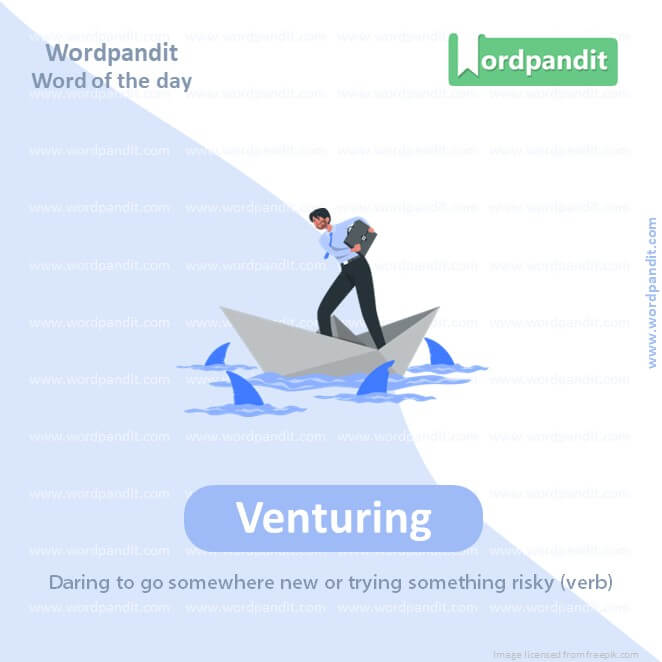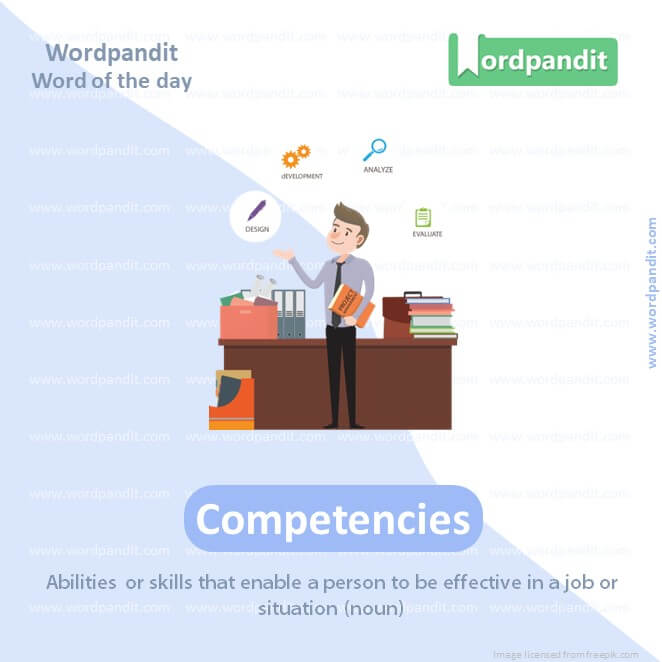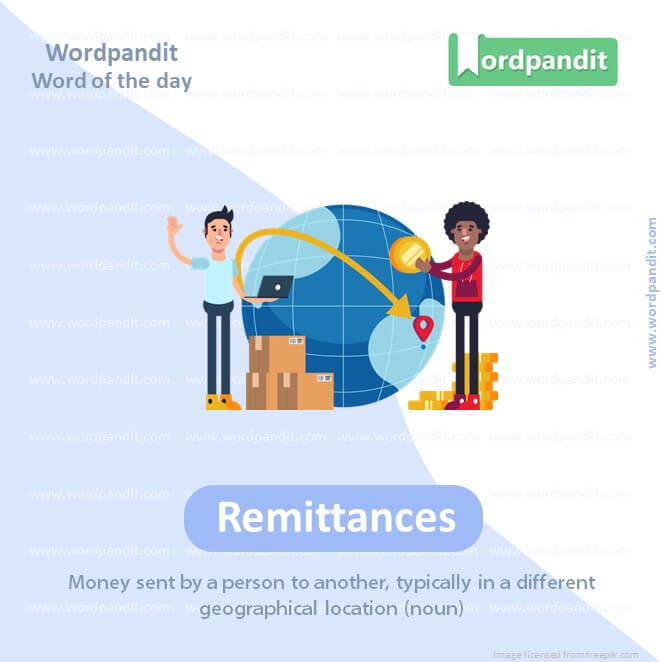Daily Vocabulary Words: List of Daily Used Words
Hi there. Welcome to this special section @ Wordpandit.
Our endeavour here is straightforward: highlighting important daily vocabulary words, you would encounter in The Hindu. This is your repository of commonly used words; essentially, we are posting a list of daily used words. Hence, this has significant practical application as it teaches you words that are commonly used in a leading publication such as The Hindu.
Visit the website daily to learn words from The Hindu.
WORD-1: Rudiments
CONTEXT: While China was barely a speck in the global merchant shipping radar, India had the rudiments in place.
SOURCE: The Hindu
EXPLANATORY PARAGRAPH: Imagine you’re learning to draw. First, you learn simple things like lines and circles. These basic, first things you learn are called rudiments. They’re like the first steps or building blocks in learning anything new.
MEANING: Basic principles or elements of a subject (noun).
PRONUNCIATION: ROO-di-ments
SYNONYMS: Basics, Fundamentals, Essentials, Foundations, ABCs.
USAGE EXAMPLE:
1. She learned the rudiments of reading and writing in kindergarten.
2. Understanding the rudiments of math is essential for further study.
3. He’s teaching them the rudiments of music theory.
4. The cookbook is great for those who only know the rudiments of cooking.

WORD-2: Venturing
CONTEXT: With private players venturing in an area dominated by large public sector facilities, India had shipyards that were beginning to give hope that they may well build ships competitively for the global market.
SOURCE: The Hindu
EXPLANATORY PARAGRAPH: Think about going on a little adventure to a place you’ve never been before, like a new playground. That’s what venturing is – going somewhere or doing something new, even if it’s a bit scary or uncertain.
MEANING: Daring to go somewhere new or trying something risky (verb).
PRONUNCIATION: VEN-cher-ing
SYNONYMS: Exploring, Daring, Risking, Adventuring, Braving.
USAGE EXAMPLE:
1. She is venturing into the world of fashion design.
2. They went venturing through the dense forest.
3. He’s venturing into a new business.
4. Venturing outside her comfort zone was difficult at first.

WORD-3: Arbitrage
CONTEXT: Labour arbitrage had preceded shipping at least two decades before it happened in IT.
SOURCE: The Hindu
EXPLANATORY PARAGRAPH: Imagine you buy a toy at one store for $5 and then sell it to someone else for $10. You made money because the toy was cheaper at the first store. Arbitrage is like that but with things like money or stocks, buying low in one place and selling high in another.
MEANING: Buying and selling assets to profit from price differences in different markets (noun).
PRONUNCIATION: AR-bi-trahj
SYNONYMS: Trading, Speculating, Dealing, Hedging, Brokering.
USAGE EXAMPLE:
1. He made a fortune through arbitrage in the stock market.
2. Arbitrage opportunities are less common now due to technology.
3. Currency arbitrage is popular among forex traders.
4. They specialized in arbitrage transactions between European markets.

WORD-4: Competencies
CONTEXT: Today, institutions across the country churn out seafarers of various grades and competencies.
SOURCE: The Hindu
EXPLANATORY PARAGRAPH: Competencies are things you’re good at or skills you have. Like being good at drawing, running fast, or solving math problems. It’s about knowing how to do something well.
MEANING: Abilities or skills that enable a person to be effective in a job or situation (noun).
PRONUNCIATION: KOM-puh-ten-sees
SYNONYMS: Skills, Expertise, Proficiency, Capability, Aptitude.
USAGE EXAMPLE:
1. The job requires various professional competencies.
2. They assessed the competencies of each team member.
3. Developing new competencies is key to career growth.
4. The training program focuses on technical competencies.

WORD-5: Seafaring
CONTEXT: Along with the growth in seafaring population, Indians, with their talent for value engineering, have grown into ship management.
SOURCE: The Hindu
EXPLANATORY PARAGRAPH: Seafaring is about traveling or working on the sea, like pirates or sailors in movies. It means someone knows how to navigate boats or ships and spends a lot of time on the ocean.
MEANING: Traveling or working on the sea (adjective).
PRONUNCIATION: SEE-fair-ing
SYNONYMS: Maritime, Naval, Nautical, Ocean-going, Sailorly.
USAGE EXAMPLE:
1. His ancestors were seafaring people.
2. The museum exhibits the history of seafaring.
3. He adopted a seafaring lifestyle.
4. The novel depicts the life of a seafaring adventurer.

WORD-6: Remittances
CONTEXT: According to Sanjaya Baru’s article in The Wire, India’s total foreign remittances are some $125 billion while China’s stands at $50 billion.
SOURCE: The Hindu
EXPLANATORY PARAGRAPH: Imagine you have a piggy bank at home, and you’re at school. Your friend gives money to your brother to put in your piggy bank. That money given and sent to your piggy bank is like remittances. It’s money sent by someone to another person, usually in another place.
MEANING: Money sent by a person to another, typically in a different geographical location (noun).
PRONUNCIATION: re-MIT-an-ses
SYNONYMS: Transfers, Payments, Allocations, Sendings, Contributions.
USAGE EXAMPLE:
1. Many families rely on remittances from relatives working abroad.
2. The country’s economy benefits greatly from remittances.
3. Remittances help fund education and healthcare for many families.
4. The government is tracking remittances for economic data.
WORD-7: Dutifully
CONTEXT: the previous leaders in shipbuilding, Chinese shipowners dutifully built most of their own ships at state-owned government yards, as Mr. Narasimhan points out.
SOURCE: The Hindu
EXPLANATORY PARAGRAPH: When you do what your parents or teachers tell you to, like cleaning your room or doing homework, that’s being dutiful. Dutifully means doing these things without being told many times or without complaining.
MEANING: Performing tasks with a sense of responsibility and obedience (adverb).
PRONUNCIATION: DOO-ti-ful-lee
SYNONYMS: Obediently, Respectfully, Conscientiously, Faithfully, Responsibly.
USAGE EXAMPLE:
1. She dutifully completed all her assignments on time.
2. He dutifully followed the doctor’s orders.
3. The soldiers served their country dutifully.
4. They dutifully attended every meeting.
WORD-8: Obliterated
CONTEXT: Only the bomb missed the shipyard and obliterated the civilian quarter. Nagasaki shipyard continues to thrive as an advanced merchant shipyard today.
SOURCE: The Hindu
EXPLANATORY PARAGRAPH: Think of building a sandcastle and then smashing it until it’s all gone. Obliterated is when something is completely destroyed or wiped out, just like the sandcastle that can’t be seen anymore.
MEANING: Completely destroyed or wiped out (verb).
PRONUNCIATION: o-BLIT-er-ay-ted
SYNONYMS: Destroyed, Erased, Annihilated, Demolished, Wiped out.
USAGE EXAMPLE:
1. The building was obliterated by the explosion.
2. His name was obliterated from the record.
3. The village was obliterated during the war.
4. Memories of the event were almost obliterated over time.
WORD-9: Curating
CONTEXT: Both curating and consuming these lists provides both a bird’s-eye view of the year’s crop and standout trends and patterns.
SOURCE: The Hindu
EXPLANATORY PARAGRAPH: Imagine you have a box where you keep only your favorite toys. You pick which toys are the best and should go in the box. Curating is like that. It’s choosing and organizing things like art in a museum or posts on a website so that only the best or most suitable ones are shown.
MEANING: Selecting and organizing items for a collection, exhibition, or presentation (verb).
PRONUNCIATION: KYOO-ray-ting
SYNONYMS: Organizing, Selecting, Managing, Assembling, Overseeing.
USAGE EXAMPLE:
1. She is curating an art exhibition for the gallery.
2. The museum’s collection was curated by a renowned expert.
3. He enjoys curating content for his blog.
4. The festival’s films are curated to suit a wide audience.
WORD-10: Indulgence
CONTEXT. This was an indulgence, a personal hat-tip to all the books I have loved over the year.
SOURCE: The Hindu
EXPLANATORY PARAGRAPH: Think about having a big bowl of ice cream when you usually have just a small one. Indulgence is when you let yourself enjoy something extra special or more than usual, like a treat or a fun activity.
MEANING: Allowing oneself to enjoy a luxury or pleasure, often more than usual (noun).
PRONUNCIATION: in-DUL-jens
SYNONYMS: Luxury, Treat, Gratification, Pleasure, Enjoyment.
USAGE EXAMPLE:
1. She bought the expensive dress as an indulgence.
2. Watching movies all day was a rare indulgence for him.
3. Chocolate is my favorite indulgence.
4. The spa day was an indulgence she felt she deserved.
Vocabulary English
In the fascinating journey of language exploration, ‘vocabulary English’ stands as a powerful pillar. It represents the diverse array of words that bring thoughts and emotions to life. However, to unlock the full potential of ‘vocabulary English’, it’s necessary to adopt a comprehensive and strategic approach.
Understanding ‘vocabulary English’ goes beyond the mere repetition of words. It demands an intricate weave of understanding, memorization, and application. To grasp the essence of the ‘vocabulary English’, diversify your language resources. Engage with novels, biographies, news articles, and digital content to introduce yourself to words in real-world contexts.
A key to mastering ‘vocabulary English’ involves leveraging effective memory techniques. Use flashcards and digital apps that support active recall and spaced repetition. Mnemonic devices can also be beneficial. Establishing personal, visual, or narrative connections to words foster better recall and understanding.
Consistent exposure to ‘vocabulary English’ greatly enhances learning. Create dedicated time slots for regular vocabulary practice. This method not only consolidates learnt vocabulary but also introduces new words on a daily basis, ensuring a balanced and continuous learning process.
Practice holds the power to transform your ‘vocabulary English’ learning experience. Application of learnt words in daily conversations, professional communication, or digital platforms embeds them deeper into your long-term memory.
In essence, embracing ‘vocabulary English’ is a marathon, not a sprint. It requires immersion in various resources, using memory-enhancement techniques, continuous exposure, and above all, incessant practice. As you navigate this path, you’ll watch your ‘vocabulary English’ grow, raising your language proficiency and connectivity with the English-speaking world. It’s a fascinating journey that opens doors to different cultures, experiences, and opportunities. So, step forth, embrace ‘vocabulary English’, and let the journey begin!













